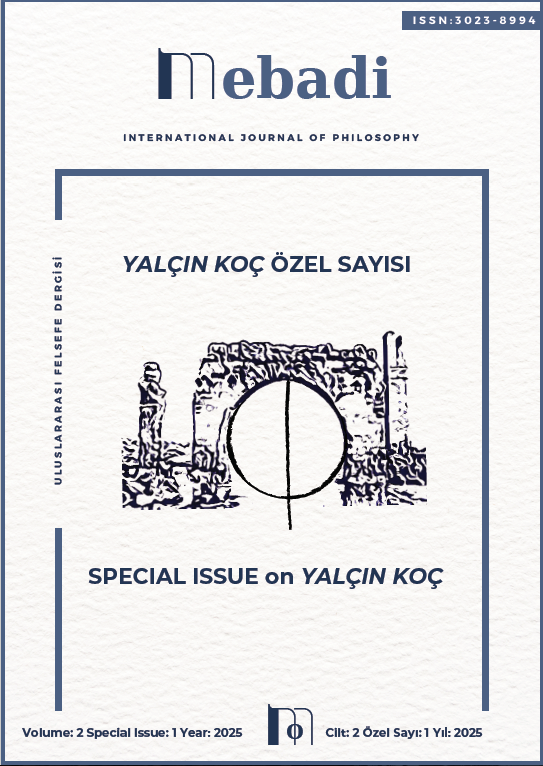A Brief Overview of Yalçin Koç and His Philosophy
DOI:
https://doi.org/10.5281/zenodo.17410838Keywords:
Yalçın Koç, Anadolu Mayası, Architectonic Language, TheoriaAbstract
The aim of this article is to briefly introduce the life of the Turkish philosopher Yalçın Koç and the intellectual perspective underlying his philosophy. Koç is a thinker who not only made significant contributions to the Turkish thought but also played an important role in revitalizing Turkish as a language of science and philosophy. As a Turkish philosopher well-versed in Western philosophy and its major problems, Koç sought solutions by drawing on the spiritual roots of Turkish thought. His original and illuminating interpretations across various fields—especially logic, metaphysics, philosophy of language, epistemology and philosophy of science, philosophy of mind, philosophy of mathematics, and moral philosophy—each presents fertile ground for further research. According to Koç, philosophy or metaphysics (which he refers to as theologia) is essentially an inquiry into the foundations and the ground upon which all else rests; and the tool (organon) of theologia is language. Therefore, the first thing that needs to be clarified is the nature, boundaries, and the source of language. However, throughout the history of philosophy, studies on language, thought, and logic have generally been limited to a single layer of human language, with little attention paid to its underlying source or ground. According to Koç, since language—and consequently logic—has a layered (architectonic) structure, it must be examined within this stratified framework.
Koç, who defines the primary function of language as formation (teşkil) and transmission (nakil), argues that language emerges in humans in layers based on genesis and fall. He maintains that language is not something acquired later in life, but rather something that arises spontaneously—through the inherent activity of the powers of the psukhe. While many philosophers, from Plato to Kant, from Wittgenstein to Heidegger, have explored the nature and boundaries of language, none has proposed a substantial view regarding its origin. Koç is the first to put forward a detailed and systematic account of the source and ground of language, under the concept of architectonic language. According to him, however, philosophers, up until now, have generally remained within the confines of propositional language, unable to articulate views on its deeper ground. From their perspective, anything that exceeds propositional language is deemed irrational—and therefore meaningless. In the Leaven Anatolian (Anadolu Mayası), however, not everything is reducible to rationality; rationality is merely a tool for explaining one layer of being. For those who draws on the Leaven of Anatolia, where rationality ends, love begins in the heart (gönül)—for love and heart (gönül) are the key to reaching the Truth. In the Western tradition, however, neither love nor gönül is present; hence, no Truth.
Downloads
Published
How to Cite
Issue
Section
Categories
License
Copyright (c) 2025 Şahabettin Yalçın

This work is licensed under a Creative Commons Attribution-NonCommercial 4.0 International License.


